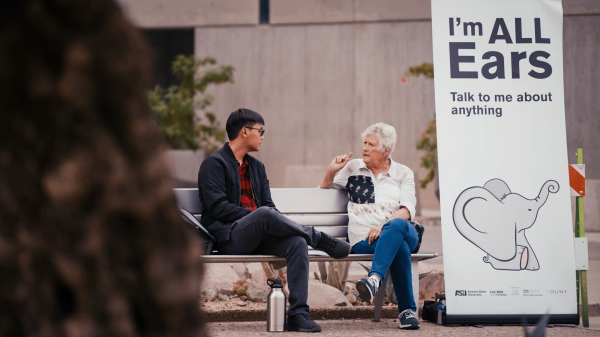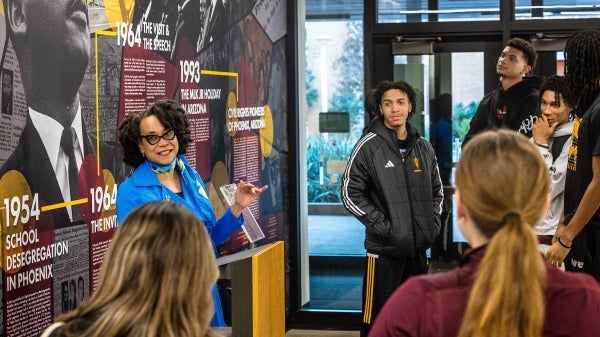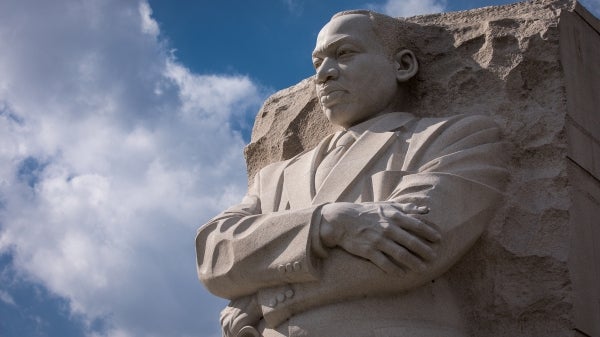Dance on the brain: Graduate connects passion for ballet with neuroscience

This spring, Trinity Anne Peek will receive her Bachelor of Science in neuroscience from ASU through ASU Online. Courtesy photo
Editor’s note: This story is part of a series of profiles of notable spring 2024 graduates.
Most people would struggle to draw a connecting line between ballet and neuroscience, but for Trinity Anne Peek, the two are intrinsically connected.
Peek, who grew up in Northern California and was homeschooled with her two brothers and sister until high school, began dancing when she was 4 years old.
As her dance career grew, so did her interest in body mechanics, so it seemed logical that an interest in physical therapy would develop in tandem with her dancing.
However, after an injury provided hands-on experience with therapists, she realized that a career in physical therapy wasn’t quite the right fit.
“I started researching more about the brain and its relation to the body and overall health,” Peek said. “I had been interested in neuroscience in the past, but I knew it would be a struggle for me to study at a traditional university in correlation with dance.”
The more she explored neuroscience, the more Arizona State University stood out, and this spring, the Redding, California, native will receive her Bachelor of Science in neuroscience from ASU through ASU Online.
“It was important to me that my education be credible if I was going to study science online. ASU Online was the best option by far,” she said.
She credits the Starbucks College Achievement Plan (SCAP), which creates an opportunity for eligible U.S. Starbucks partners to earn their bachelor's degrees online at ASU with 100% upfront tuition coverage, allowing her to pursue her career and high-quality education in tandem.
While earning her degree, Peek was accepted to a professional ballet training program in New York. Her online coursework enabled her to complete her assignments around her busy schedule, travel and intensive training regimen.
Today Peek is prepared to step into the future with her degree and a dance career.
“I have so far been offered several jobs and interning opportunities as a result of my education at ASU,” she said. “I am so excited to enter a new time of my life filled with scary unknowns but also an endless world of possibility.”
We spoke with the new grad about her experience as an online student and her plans after graduation.
Question: What was your “aha” moment when you realized you wanted to study the field you majored in?
Answer: As a dancer, the human body and its inner workings have always been of particular interest to me. It is crucial to understand the anatomy and physiology of the body in order to move with apparent ease and fluidity. It is also important for injury prevention, as shifting the body in the slightest wrong way can cause long-term problems.
In high school and my early college years, I thought my educational pathway would take me into the field of sports medicine and physical therapy. After a knee injury and some hands-on experience with what that kind of career looks like, I realized that it was not a deep enough analysis of the body for me.
During this time, I also began to understand the more psychological and mental strains of being a dancer and an adult. Additionally, a couple of people in my life went through serious medical problems associated with seizure, stroke and severe hormone imbalances. As I learned with them, I realized just how pivotal the brain is, not only for essential function but for every demand of the body. The more I learned, the greater my desire for further understanding grew. When I saw that ASU offered a bachelor’s in neuroscience, I was ecstatic and my enthusiasm has only been inspired more and more.
Q: What’s something you learned while at ASU Online — in the classroom or otherwise — that surprised you or changed your perspective?
A: One thing that changed my perspective while at ASU Online is the way that education is often perceived as a one-path route. When I first decided to pursue my education online, many people in my life expressed concerns. Finishing high school two years early, attending community college and finishing my bachelor’s online is sometimes perceived as settling for a “lesser” education. This has never been my goal, but I often felt alone and unsupported in my choices.
While at ASU Online, I discovered a world of driven and determined students who not only had goals for themselves but also strived to change the education system for the better. After the coronavirus pandemic, a self-paced, hybrid learning system became necessary for students of all ages. It definitely came with challenges, but it also paved the way for new educational options.
ASU Online, which had been implemented long before the pandemic, has been a great example of how online learning can be successful. My time with ASU has altered my prior perspectives of what academic success looks like, and I hope that it can continue to teach others as well.
Q: Why did you choose ASU Online?
A: I currently have many interests in demanding and difficult fields of study. ASU Online has enabled me to study a rigorous subject I desire while also having the ability to make a living and train long days as an athlete.
My days often start at 4 a.m. and end at about 9 p.m. I was able to pursue my education because it is flexible, online and I am able to study wherever I am. I have been able to balance the best of all my worlds without cutting corners or having to fall short of expectations.
Q: Which professor taught you the most important lesson while at ASU Online?
A: I feel incredibly fortunate to have had many ASU instructors take the time and effort to stay active on our community forums. I honestly cannot select a single person.
Professors such as Dr. Rachel Bristol, Dr. Veronica Peña, and Dr. Josh Klein were incredible instructors who dedicated so much of their time to ensure availability for questions or concerns that we students had.
The courses taught by these instructors were some of the most challenging but invigorating classes of my time at ASU. Each of them taught me slightly different lessons but, overall, I have walked away with a new perspective on determination and perseverance. I think it is important that we experience difficult challenges because we can then learn to strive for understanding, grow from our mistakes and find success in the process.
Q: What’s the best piece of advice you’d give to those still in school?
A: Someone once told me, “Education is the one investment we often try to get the least out of.”
This was such a powerful sentence for me throughout my college experience. It is inevitable to have off days and feel overwhelmed, stressed or straight-up bored with the work that college assigns. Especially in an online format, it is easy to drift off and lose the dedication that is required to succeed. My advice would be to remember that it is a privilege to learn and you will never regret taking the time to understand the world around you. Everyone has a different journey, and no one knows where life is going to take us, so make the most out of what is in front of you.
Q: What was your favorite spot for power studying?
A: My favorite spot for power studying has to be a bright cafe or coffee shop with a view. I am the kind of person who gets distracted so easily. I have found that if I am able to get outside of my home and into a studious environment, I can get so much more done. There is a cafe in my city called Theory, which has an amazing atmosphere. It has tall, two-story windows and is spacious but not so busy that I am unable to focus. Also, it has the BEST matcha latte for anyone who is a tea drinker. During finals week, it is safe to say that this is where you will find me living!
Q: What are your plans after graduation?
A: This summer, I will be going on tour with a group to China to perform classical ballet in several cities and theaters across the country. When I return to the United States, I plan to seek out new opportunities in both the dance world and the medical field for clinical experience. I am ultimately interested in becoming a physician assistant and also gravitate towards the ideologies of holistic medicine. My hope is to gain further experience in related areas but will be open to opportunities that present themselves.
Q: If someone gave you $40 million to solve one problem on our planet, what would you tackle?
A: Such a good question, but so hard to answer! If someone gave me $40 million to solve a problem on our planet, I think I would seek to provide further education on critical thinking.
I would love to see more people think outside the box and creatively. With the influence of peers, social media and other outlets, it is easy to get lost in the ocean of loud opinions. In many ways, people have learned to become reliant on others for their world perspectives. I feel that this will soon lead to a polarized society and lack of innovative theory.
Change in the world, whether medical, environmental or technological, starts with human cognition. I feel that my experiences have led me to consider life differently and seek out truth and confirmation in all areas. Learning can take place anywhere, and although $40 million is small in the grand scheme of the world, I would love to see awareness brought to the importance of critical thinking and individual problem-solving. Potentially, this could be through conventions or events at schools to promote learning to optimize cognitive potential so that we can all individually contribute unique solutions to the problems of our daily and future livelihood.
More Sun Devil community

ASU connects younger, older generations to ease loneliness
When Pencie Culiver sits down on a bench every Tuesday outside Coor Hall, the students are drawn to her and her big sign that says, “I’m All Ears.”She soothes their sorrows, delights in their joys…

Local athletes get crash course on Black history in Arizona
Basketball players from Arizona State University and the Valley Suns gathered on Jan. 6 to learn about Black history in Arizona and Martin Luther King Jr.’s visit to ASU's Tempe campus in 1964.The…

ASU names 2025 MLK Servant-Leadership Award recipients
The 2025 honorees have been named for Arizona State University's annual MLK celebration awards.The four awards — community, faculty, staff and student — recognize leaders who dedicate themselves to…
